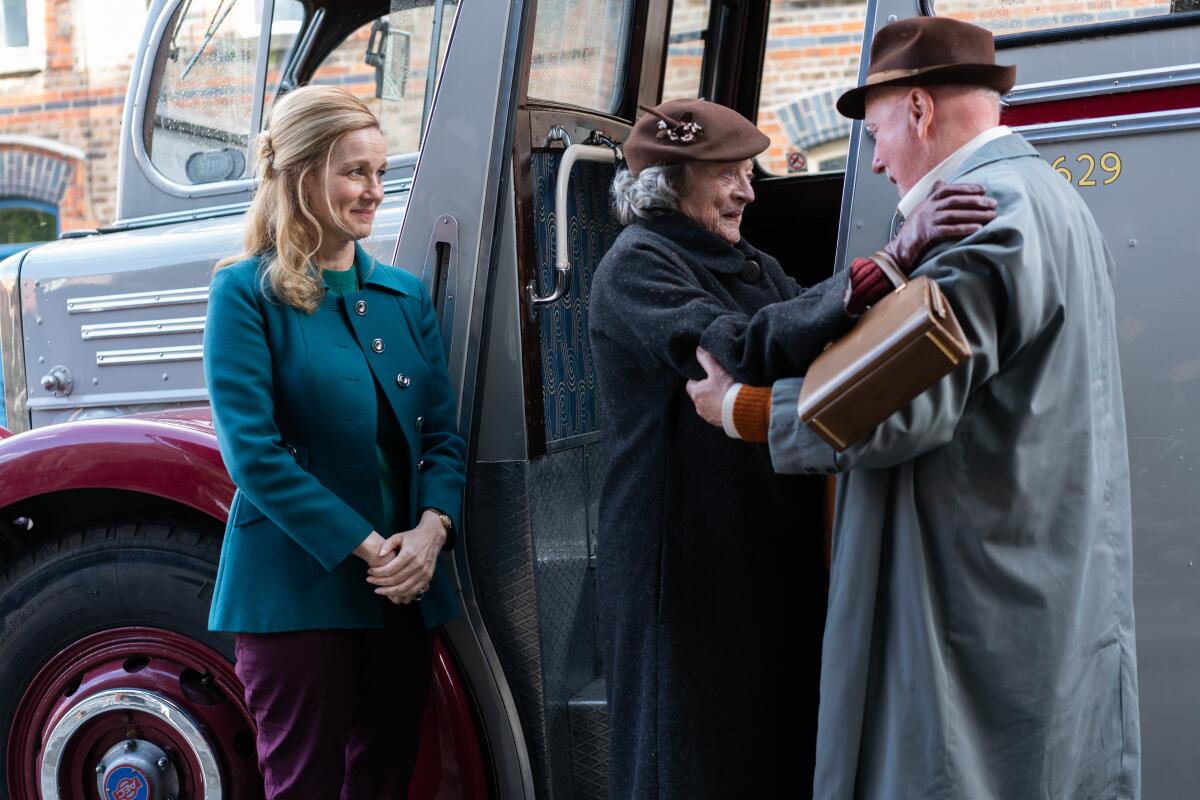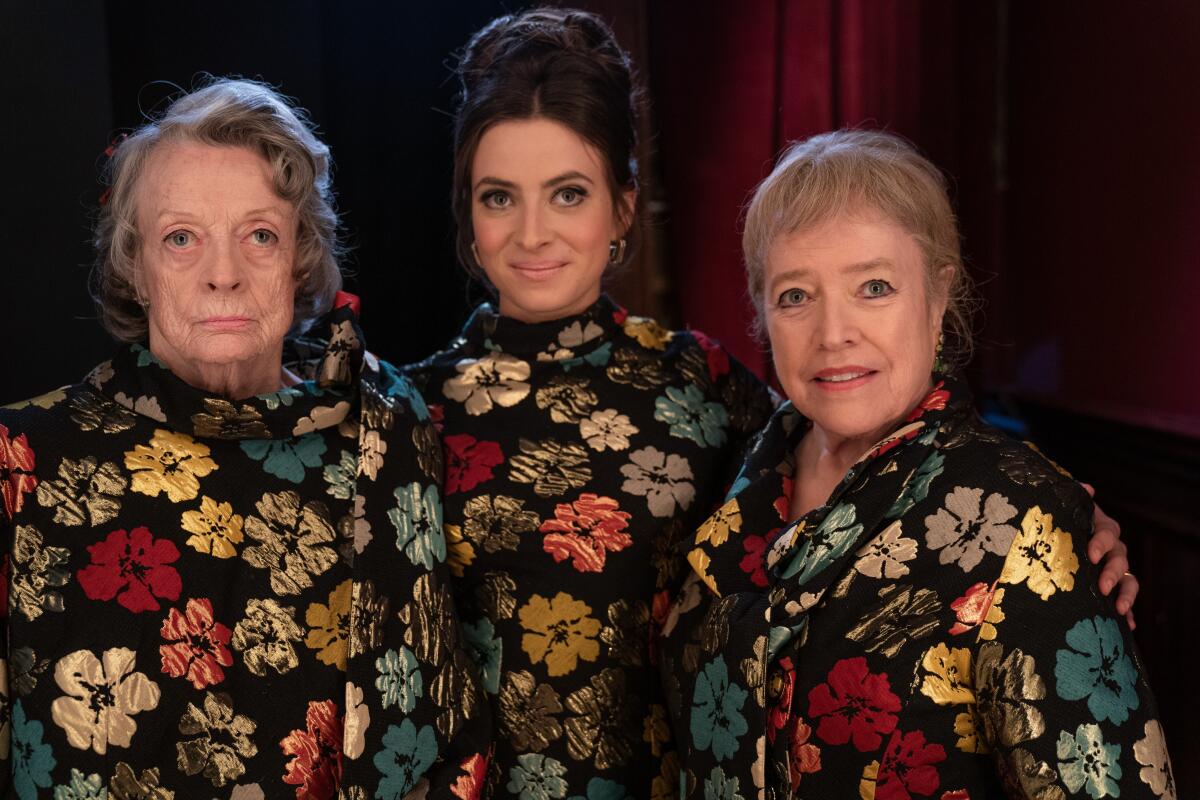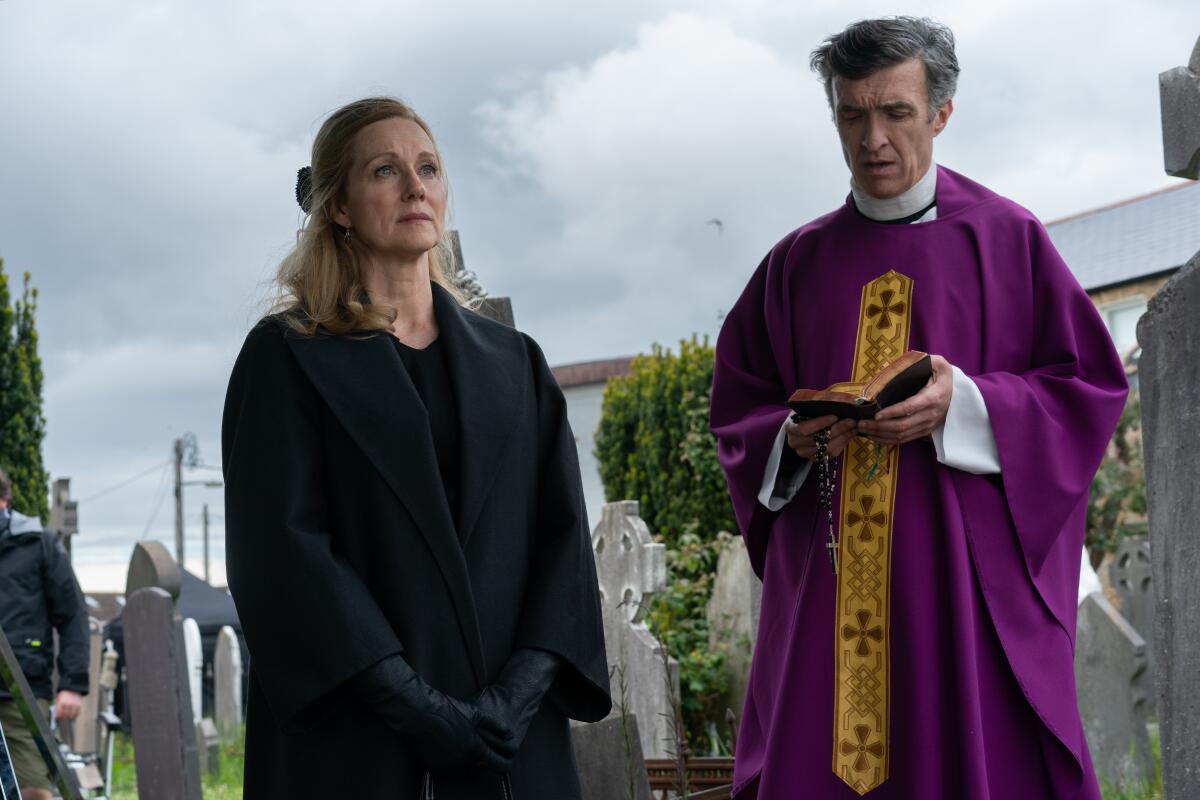‘The Miracle Club’ gathers a powerhouse cast to feast on a thick slice of Irish ham

- Share via
“Mother of God,” says Maggie Smith flintily, when her character is confronted with something of which she disapproves — which is most things — in Irish director Thaddeus O’Sullivan’s blandly buttery “The Miracle Club.”
“Mother of God,” said a young Bernadette, presumably, when the Virgin Mary first came to her in a grotto in Lourdes in 1858, an apparition that, had Mary known it would indirectly lead to this movie, she might in her Infinite Mercy have thought twice about. It’s also what you may find yourself muttering darkly, depending on your feelings about mild blasphemy as a response to blarney-slathered pablum about female fortitude and forgiveness in 1960s Ireland, a film that boasts about as much edge as a digestive biscuit (translation: oatmeal cookie) too long dunked in milky tea.
Speaking of lukewarm tea, it’s the only kind spilled when Chrissie (Laura Linney) returns to Ireland in 1967, after decades of American exile, following the death of her mother. Her sudden reappearance ruffles feathers, particularly those of her mother’s friends, Lily (Smith), a querulous lady still grieving for a son who drowned 40 years prior at age 19, and Eileen (Kathy Bates), the indomitable matriarch of a raucous brood of kids and grandkids (“I luv dem little feckers!” she announces) who has just discovered a lump on her breast. Chrissie’s arrival coincides with a talent show, organized by the local priest, Father Byrne (Mark O’Halloran), that Lily, Eileen and Dolly (Agnes O’Casey), a young mother who frets over her son’s muteness, are determined to win. The prize is a pair of tickets to the Catholic pilgrimage site of Lourdes, and all three could use a miracle.

They don’t actually win. And given the broadness of the performances, which are often enjoyable despite a range of sporadically accurate Irish accents, no joke in “The Miracle Club” is funnier than the fact that their second-place consolation prize is a great big ham.
But never fear: After some pointless convolutions, all three women do eventually go to Lourdes, as does Chrissie, for reasons never clear. So while back at home their menfolk, including an amiably befuddled Stephen Rea, struggle with the most basic of domestic tasks — burning the stew, botching a diaper change, men, eh? — in Lourdes, secrets are revealed, healing baths are taken and old grievances atoned for in a way that could be called “miraculous” if you consider that word a synonym for “trite.” Certainly the screenplay gives little sign of having been a long-gestating passion project of co-writer Jimmy Smallhorne’s (it is inspired by his own mother), except perhaps in that passion evidently cools over time.
Script aside, the film feels off from the very first beat, and not just because the title “Dublin 1967” appears over a swooping shot of Dublin Bay complete with iconic red-and-white chimney, a landmark that would not be built for another couple of years. It’s also because of the shot itself: the weightless sterility of a digital aerial drone that feels as inorganic to the twee setting as it would if one of the carefully miniskirted, mod-hatted ‘60s youngsters were to suddenly start vaping.

Then again, perhaps the establishing drone shot is necessary, amid cinematographer John Conroy’s otherwise bright, competent images, to match the artificiality of the comped-in Lourdes backdrops. “I can’t believe it, we’re really here!” cries one character, which is funny because they’re not. Instead the French town’s cathedral is green-screened like a holy vision; a very obviously Irish hotel stands in for Lourdes lodgings by virtue of a French flag hanging limply over the entrance; and spartan interiors are filled with vaguely French-sounding background noise, like a hundred off-screen voices saying “Oignon oignon oignon.”
But it doesn’t really matter. None of these doughty Irish mams, abroad for the first time in their lives, display the slightest curiosity about their surroundings, or indeed anything beyond the horizons of their own tangled histories. It’s just another way in which “The Miracle Club” faintly patronizes the very women it’s supposed to celebrate, just like Father Byrne does when he priestsplains to Eileen sagely, “You don’t come to Lourdes for a miracle, you come for the strength to go on when there is no miracle.” As if any of these cross-bearing, child-rearing, husband-handling women need to be taught about strength. Mother of God.
'The Miracle Club'
Rating: PG-13, for thematic elements and some language
Running time: 1 hour, 31 minutes
Playing: Starts July 14 in general release
More to Read
Only good movies
Get the Indie Focus newsletter, Mark Olsen's weekly guide to the world of cinema.
You may occasionally receive promotional content from the Los Angeles Times.









